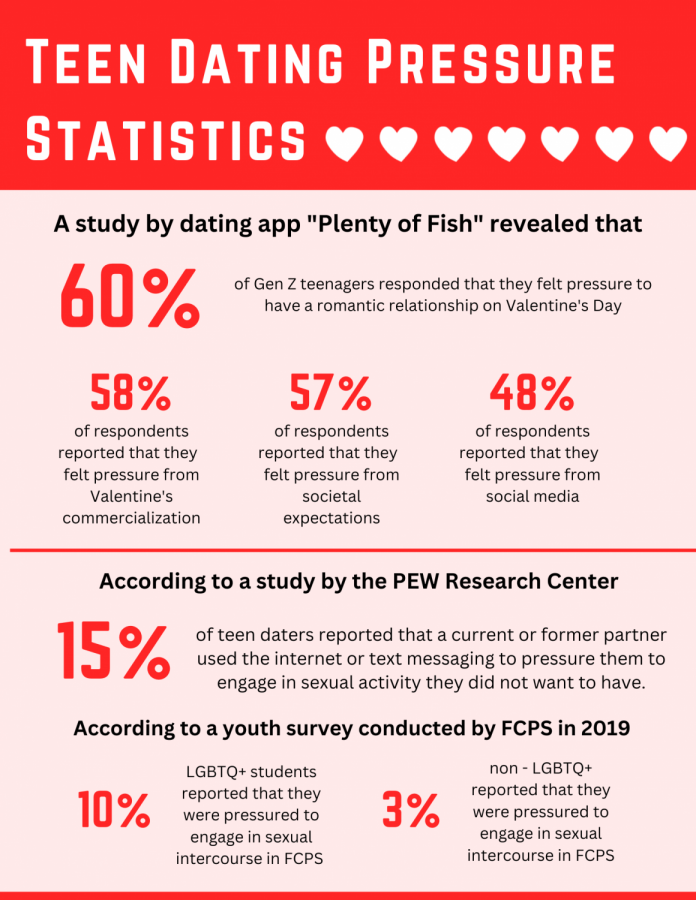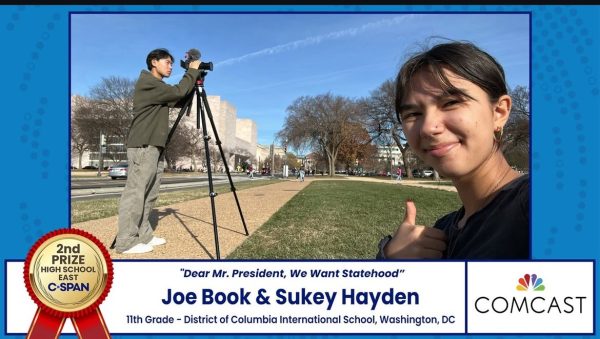Under Pressure
Bruins discuss what influences their perceptions of teen dating
With Valentine’s Day around the corner, love is in the air and there’s a certain kind of pressure to be coupled up. “Every high school movie has some high school couple. There’s couples everywhere you look,” Sophomore Kailynn Haughton said. A study by the “Plenty of Fish” dating app revealed that 43% of singles consider Valentine’s Day to be “the most pressure-filled holiday”. So what exactly contributes to this pressure?
Sophomore Symone Christian stated that the biggest pressure exerted on teens today is the media. “The media has projected what high school dating is or a glorified look into it,” she said. “That it’s like a dream and it’s like all you have to live for. But it’s not. That’s television.”
However, there’s two sides to the story when high school relationships are portrayed in the media. The dramatization goes both ways: an unrealistic perception of “happily ever after” or the extremely toxic miscommunication seen in Romeo and Juliet.
“I feel like the way that high school relationships are portrayed is toxic because it doesn’t really display what a healthy relationship is,” Sophomore Sky Robertson said.
When asked how the media influenced his perspective, Sophomore George Levy responded that his views on dating were negatively impacted. “Honestly, it has made dating seem kind of annoying to me,” he said. “I don’t see the appeal as much because all I see is people cheating on other people. I don’t want that.”
The media isn’t the only pressure. According to a survey by PEW research center, 22% of people in the United States responded that they feel some pressure from friends to date, while 37% say that they felt societal pressure.
“People see it as a social status thing,” Sophomore Xavier Junius said. “You can’t even say that everyone’s doing it because not everyone is doing it. But everybody wants to have a good relationship.”
Social media has also played a role in the way teens view dating. In fact, according to a study by the Plenty of Fish dating app, nearly 48%) of teens responded that the hype around relationships on social media has also contributed to the pressure both to date and fit a certain standard when dating.
So how are teens at Lake Braddock coping with the pressure to date?
Christian believes that she has to learn more about herself as a person before delving into the world of dating. “I do feel pressure but I feel like I have to find myself before I do that,” she said. “I know what’s for me and what’s not for me. You should know yourself before jumping into a relationship.”
In fact, for many teens, dating is something that they want when the right time comes.
“If I find the right person I would probably date, but I’m not going to go on a quest to find some random girl to date,” Levy said. “I want to just have a crush on someone and then see where that goes – I’m not going to make it artificial.”
Junius believes that dating in high school can be helpful for learning about your needs in a relationship. “It gives you an idea of what you’re looking for so that when you’re in college, you’re not dating the wrong sort of person.”
Sophomore Autumn Dunlop started dating this school year. Her favorite part about having a romantic relationship is the companionship. “The most rewarding part is that you have another best friend and person that you can go to and share what you want with them,” she said. “You get to kind of experience all of your memories through another person as you’re sharing it with them. You can learn about them, and you can learn more about yourself.”
Dunlop’s advice to students under pressure is to set boundaries and create their own standard for a relationship instead of conforming to the stereotypes. “I think celebrities and typical movies or media can impact what the typical teen thinks dating should look like, but I don’t think that that should be in the way of what they actually practice in real life. Instead, I think that they should just explore on their own what they want it to look like, instead of letting the media impact their decisions.”






